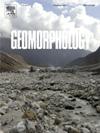Seasonal vertical accretion in different hydro-geomorphic environments of Indian Sundarban: Assessing the role of mangroves in mitigating sea level rise impacts
IF 3.1
2区 地球科学
Q2 GEOGRAPHY, PHYSICAL
引用次数: 0
Abstract
The Indian Sundarban, renowned for its unique hydro-geomorphic diversity, faces rising threats from sea level rise, necessitating an examination of the spatio-temporal variation of vertical accretion and the role played by mangroves in mitigating these impacts. As such, fifteen transects were chosen across buffer and transition zones of Indian Sundarban, each equipped with 4–6 sedimentation pins, to gauge accretion rates in premonsoon, monsoon, and postmonsoon season during period March 2020 to March 2022, considering diverse hydro-geomorphic attributes. The vertical accretion rate exhibits a curvilinear pattern, ascending from the lower seafront zone towards the middle of the estuarine region, reaching a peak, and subsequently declining towards the upper estuarine zones. Specifically, in the seafront zone, the yearly mean accretion (focusing solely on accretion and excluding subsidence) ranges between 5 and 10 mm/year, while in the middle estuarine region, it increases to an average of 38.1 ± 9.44 mm/year. However, in the upper zone, the yearly mean accretion decreases slightly to approximately 17.71 ± 9.54 mm/year. Similar patterns are observed when considering the distance from the riverfront to the interior of the mangrove zones. Seasonal analysis demonstrates that the postmonsoon period exhibits the highest accretion, followed by the premonsoon season, while the monsoon tends to be erosional in nature. Mangrove zonation, and subsequent distribution of root height, root diameter, root density, tree density, tree basal area, inundation frequency, current speed, variation in suspended sediment concentration were identified as influential factors affecting vertical accretion rates. Based on multiple regression analysis, root density, inundation frequency, and tree density demonstrated moderate-positive correlations with vertical accretion, whereas distance from the riverfront, root height, and root diameter displayed negative correlations. This study enhances our understanding of the intricate processes behind vertical accretion in the Sundarban, offering valuable insights for future research and advancing discussions on the broader implications of climate change in coastal regions.
印度巽他班不同水文地貌环境中的季节性垂直增生:评估红树林在减轻海平面上升影响方面的作用
印度巽他湾以其独特的水文地质多样性而闻名于世,它面临着海平面上升带来的日益严重的威胁,因此有必要对垂直增生的时空变化以及红树林在减轻这些影响方面所起的作用进行研究。因此,我们在印度巽他班的缓冲区和过渡区选择了 15 个横断面,每个横断面配备 4-6 个沉积针,以测量 2020 年 3 月至 2022 年 3 月期间季风前、季风和季风后季节的增生率,同时考虑到不同的水文地质属性。垂直吸积率呈现曲线模式,从下部海滨区向河口区中部上升,达到峰值,随后向河口区上部下降。具体而言,在海滨区,年平均增量(仅指增量,不包括沉降)介于 5 至 10 毫米/年之间,而在河口区中部,年平均增量增至 38.1 ± 9.44 毫米/年。然而,在上层区域,年平均增量略有下降,约为 17.71 ± 9.54 毫米/年。从河岸到红树林区内部的距离也可以观察到类似的模式。季节分析表明,季风后时期的增殖量最大,其次是季风前时期,而季风时期往往具有侵蚀性。红树林分区以及随后的根高分布、根直径、根密度、树木密度、树木基部面积、淹没频率、水流速度、悬浮沉积物浓度变化被确定为影响垂直增殖率的影响因素。根据多元回归分析,根系密度、淹没频率和树木密度与垂直增殖呈中度正相关,而与河岸的距离、根系高度和根系直径呈负相关。这项研究加深了我们对巽他班垂直增生背后复杂过程的理解,为未来研究提供了宝贵的见解,并推动了有关气候变化对沿海地区更广泛影响的讨论。
本文章由计算机程序翻译,如有差异,请以英文原文为准。
求助全文
约1分钟内获得全文
求助全文
来源期刊

Geomorphology
地学-地球科学综合
CiteScore
8.00
自引率
10.30%
发文量
309
审稿时长
3.4 months
期刊介绍:
Our journal''s scope includes geomorphic themes of: tectonics and regional structure; glacial processes and landforms; fluvial sequences, Quaternary environmental change and dating; fluvial processes and landforms; mass movement, slopes and periglacial processes; hillslopes and soil erosion; weathering, karst and soils; aeolian processes and landforms, coastal dunes and arid environments; coastal and marine processes, estuaries and lakes; modelling, theoretical and quantitative geomorphology; DEM, GIS and remote sensing methods and applications; hazards, applied and planetary geomorphology; and volcanics.
 求助内容:
求助内容: 应助结果提醒方式:
应助结果提醒方式:


